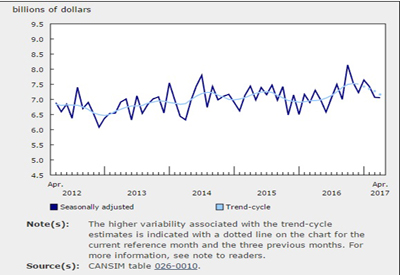April Building Permits: Value Declines 0.2% from March

June 19, 2017
Canadian municipalities issued $7.1 billion worth of building permits in April, down 0.2% from March. Lower construction intentions for single-family dwellings were mainly responsible for the national decrease. The value of building permits declined in four provinces in April, led by Ontario and Alberta.
Residential sector: decline in single-family component moderated by gain in multi-family dwellings
The value of residential building permits issued by Canadian municipalities fell 2.5% in April to $4.5 billion, marking a third consecutive monthly decrease. Lower construction intentions for single-family dwellings more than offset a moderate gain in the multi-family component. In April, three provinces posted declines in the residential sector, led by Ontario.
Construction intentions for single-family dwellings fell 8.1% in April to $2.5 billion. The decrease stemmed primarily from single-detached homes in Ontario, specifically the Toronto census metropolitan area (CMA), while five other provinces also reported declines in the single-family building component.
Conversely, multi-family dwelling construction intentions rose 5.6% in April to just under $2.0 billion, largely due to gains in seven provinces, led by British Columbia. The increase followed a 21.1% drop in March and was moderated by a notable decline in the apartment building category in Alberta.
Canadian municipalities approved the construction of 16,701 new dwellings in April (down 0.7% compared with March), consisting of 6,015 single units (-1.5%) and 10,686 multi-family units (-0.2%).
Non-residential sector: Institutional and industrial components register second consecutive monthly growth
Municipalities issued $2.6 billion worth of building permits for non-residential structures in April, up 4.1% from the previous month. The increase was mainly the result of higher construction intentions for institutional and industrial structures, with both components rising for a second consecutive month. Eight provinces registered gains in the non-residential sector in April, led by British Columbia.
The institutional component rose 10.7% in April to $790 million, following a 18.3% increase in March. Higher construction intentions for government administration buildings and medical facilities, including a major hospital renewal project in Ontario, contributed most to the gain. The institutional component rose in six provinces in April, led by British Columbia.
The value of building permits issued for industrial structures rose 14.6% to $512 million in April, following a 12.3% gain the previous month. The increase in April was mainly attributable to manufacturing plants, utility buildings, and maintenance facilities.
In contrast, the commercial component decreased 3.0% in April to $1.3 billion, largely due to lower construction intentions for warehouses in Ontario.
Provinces: Ontario and Alberta report largest declines
Ontario and Alberta led the decrease in the total value of building permits in April, moderated by an increase in British Columbia.
The decline in Ontario marks a fourth consecutive monthly decrease in both the value of residential building permits and the total number of new dwelling units approved. Meanwhile, the industrial component increased for a second consecutive month in April, rising above $200 million for the first time since August 2016.
In Alberta, the decline was led by apartment buildings and industrial structures. The decline in April follows the approval of a large bus storage facility project in March. The decrease was moderated by the single-family component, which posted a fourth consecutive monthly gain in April.
In contrast, every building component in British Columbia rose in April. The value of institutional building permits increased for a second consecutive month, partly due to construction intentions for a new university building in the Vancouver CMA.
Census metropolitan areas: Toronto posts notable decrease led by single-family dwellings
In April, the value of building permits fell in 11 of 36 CMAs, led by Toronto.
The single-family component was primarily responsible for the decline in the Toronto CMA, which registered both the lowest level of single-family construction intentions and the lowest number of new single-family dwelling units approved since January 2016.
Meanwhile, the Vancouver CMA reported the largest increase in the value of building permits in April, with every building component recording gains.
Source: Statistics Canada, www.statcan.gc.ca/daily-quotidien/170607/dq170607a-eng.htm.



![Guide to the Canadian Electrical Code, Part 1[i], 26th Edition– A Road Map: Section 56](https://electricalindustry.ca/wp-content/uploads/2022/11/Guide-CE-Code-2-768x432.png)




![Guide to the Canadian Electrical Code, Part 1[i], 26th Edition– A Road Map: Section 56](https://electricalindustry.ca/wp-content/uploads/2022/11/Guide-CE-Code-2.png)






